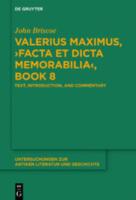
De Gruyter (2019) h/b £89 280pp (ISBN 9783110664249)
B. is well known for his commentaries, texts and textual studies on Livy and Valerius Maximus. Here he offers a commentary on a book which Briscoe describes as having especially interesting and varied subject matter including trials at Rome; and from Greece and Rome, examples of study and hard work (especially by philosophers); oratory; artistic skill; longevity; and finally glory and honours.
B. includes preface, text with apparatus criticus, commentary and various indexes, but no translation (unlike Wardle’s commentary on book 1 in the Clarendon Ancient History Series). Instead he frequently refers to Shackleton Bailey’s Loeb translation (2000). Besides the usual introduction to the author and his work, the preface includes in summary form the main source for each of Valerius’ examples (as established in the commentary). It also includes a survey of Valerius’ language and style, compared to Cicero and Livy.
B.’s is a very scholarly work, including a good deal of textual criticism. He is always careful to explain how mistakes in the copying of the text have arisen (‘the scribe’s eye moving from the first “e” to the second’ is a typical comment). He is ready to be critical of scholarship, including, frequently, his own: ‘my apparatus is in error in three respects’ (p. 143) is a not atypical admission! (An appendix lists corrections to his Teubner edition of Valerius). And he is also frank about the shortcomings of ‘his (second) author’: ‘V. neither understood nor cared about the details’ (p. 69), and ‘V. garbled and abbreviated his source to near the point of unintelligibility’ (p. 195). So, for example, on Gabinius (cos. 58) in VIII.1 absol. 3, where Shackleton Bailey’s note suggests that Valerius’ story refers to a trial of Gabinius not known from other sources, B. more simply suggests that V. was confused about procedure and got the story wrong.
B. writes well, and for a British audience (David Blunkett and Roy Jenkins are adduced as modern parallels for Appius Caecus and Demosthenes). He has been reasonably well-served by his copy-editors, though I noted a sprinkling of missed brackets and a few other typographical mistakes. More strangely, he twice writes ‘forbad’ for ‘forbade’, and says that Tiberius gave descendants of the orator Hortensius the sum of 200 sesterces (p. 112), where the figure must have been 200 thousand (Tac. Ann. 2.38). Otherwise his scholarship is impressive and worn lightly, with Socratic professions of ignorance regarding Greek philosophy and visual matters.
M.G.L. Cooley
Warwick School
